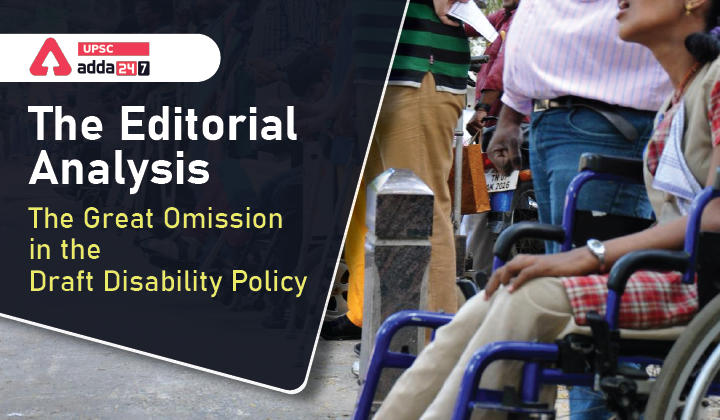Table of Contents
The Great Omission in the Draft Disability Policy- Relevance for UPSC Exam
- GS Paper 2: Governance, Administration and Challenges- Welfare schemes for vulnerable sections of the population by the Centre and States and the performance of these schemes.
Draft Disability Policy in News
- The Department of Empowerment of Person with Disabilities (DoEPwD) recently released the draft of the national policy for persons with disabilities (“Policy”).
Draft Disability Policy
- Need: The necessity for a new policy which replaces the 2006 policy was felt because of multiple factors such as-
- India’s signing of the United Nations Convention on Rights of Persons with Disabilities;
- Enactment of a new disability legislation (Rights of Persons with Disabilities Act 2016) which increased the number of disabilities from seven conditions to 21 and
- Being a party to the Incheon Strategy for Asian and Pacific Decade of Persons with Disabilities, 2013-2022 (“Incheon commitment”).
Incheon Strategy
- Incheon Strategy was prepared under the aegis of the United Nations Economic and Social Commission for Asia and the Pacific (UNESCAP).
- Incheon Strategy identifies 10 goals for Asia-Pacific countries to ensure the inclusion and the empowerment of persons with disabilities and conformity with the Sustainable Development Goals 2030.
- These commitments have changed the discourse around disability by shifting the focus from the individual to society, i.e., from a medical model of disability to a social or human rights model of disability.
Draft Disability Policy
- About: The principle of the draft policy is to showcase the Government’s commitment to the inclusion and empowerment of persons with disabilities by providing a mechanism that ensures their full participation in society
- Key Features: the policy document highlights a detailed commitment to education, health, skill development and employment, sports and culture, social security, accessibility and other institutional mechanisms.
- Cooperation: The document lays emphasis on the point that central and State governments must work together with other stakeholders to “make the right real”.
Associated Concerns of Disabled People in India
- Failed to Recognize Right to Political Participation of Disabled People: India does not have any policy commitment that is aimed at enhancing the political participation of disabled people.
- The Incheon goals also promote participation in political processes and in decision making.
- Political parties in India still do not find the disabled as the large electorate to specifically address their needs.
- Accessibility Issue: The Rights of Persons with Disabilities Act 2016 recognises the political domain wherein disabled people should be allowed to realise their human rights and fundamental freedoms. However, there are various examples of inaccessibility like-
- There is often a lack of accessible polling booths in many locations.
- There is still no widespread adaptation of braille electronic voting machines and even wheelchair services at all polling centres.
- The Election Commission of India has developed its own procedures for handling PwDs during the electoral process.
- The lack of live aggregate data on the exact number of the disabled people in every constituency only furthers their marginalisation.
- The lack of accessible space for party meetings, inaccessible transport for campaigning or an attitudinal barrier among voters and party leaders can be termed as contributing factors.
- Examples of Political Exclusion: The exclusion of disabled people from the political space happens at all levels of the political process in the country, and in different ways, aggravating the marginalisation of the disabled. For instance-
- The inaccessibility of the voting process,
- Barriers to participation in party politics or
- A lack of representation at the local, State or national levels.
- Inadequate Representation: Disabled people are not represented enough at all three levels of governance.
- The response to a right to information filing by this writer to the Parliamentary Affairs Ministry showed that the Government does not maintain data on the disability aspect of members.
- However, few States have begun the initiative at local levels to increase participation.
- For instance, Chhattisgarh started the initiative of nominating at least one disabled person in each panchayat.
- If a disabled person is not elected, then they are nominated as a panchayat member as per changes in the law concerned.
Draft Disability Policy- Way Forward
The goal of the policy document — of inclusiveness and empowerment — cannot be achieved without political inclusion. The policy can follow a four-pronged approach-
- Building the capacity of disabled people’s organisations and ‘empowering their members through training in the electoral system, government structure, and basic organisational and advocacy skills’;
- The creation, amendment or removal of legal and regulatory frameworks by lawmakers and election bodies to encourage the political participation of the disabled;
- Inclusion of civil societies to ‘conduct domestic election observation or voter education campaigns’; and
- A framework for political parties to ‘conduct a meaningful outreach to persons with disabilities when creating election campaign strategies and developing policy positions’.
Draft Disability Policy- Conclusion
- This right can be made real only when it includes political rights/political participation within it. This will only conform to the universal principle on disability, i.e., “Nothing about us. Without us.”
India’s International Cooperation in disability sector- An Overview
India’s International Cooperation in disability sector- An Overview





 TSPSC Group 1 Question Paper 2024, Downl...
TSPSC Group 1 Question Paper 2024, Downl...
 TSPSC Group 1 Answer key 2024 Out, Downl...
TSPSC Group 1 Answer key 2024 Out, Downl...
 UPSC Prelims 2024 Question Paper, Downlo...
UPSC Prelims 2024 Question Paper, Downlo...
